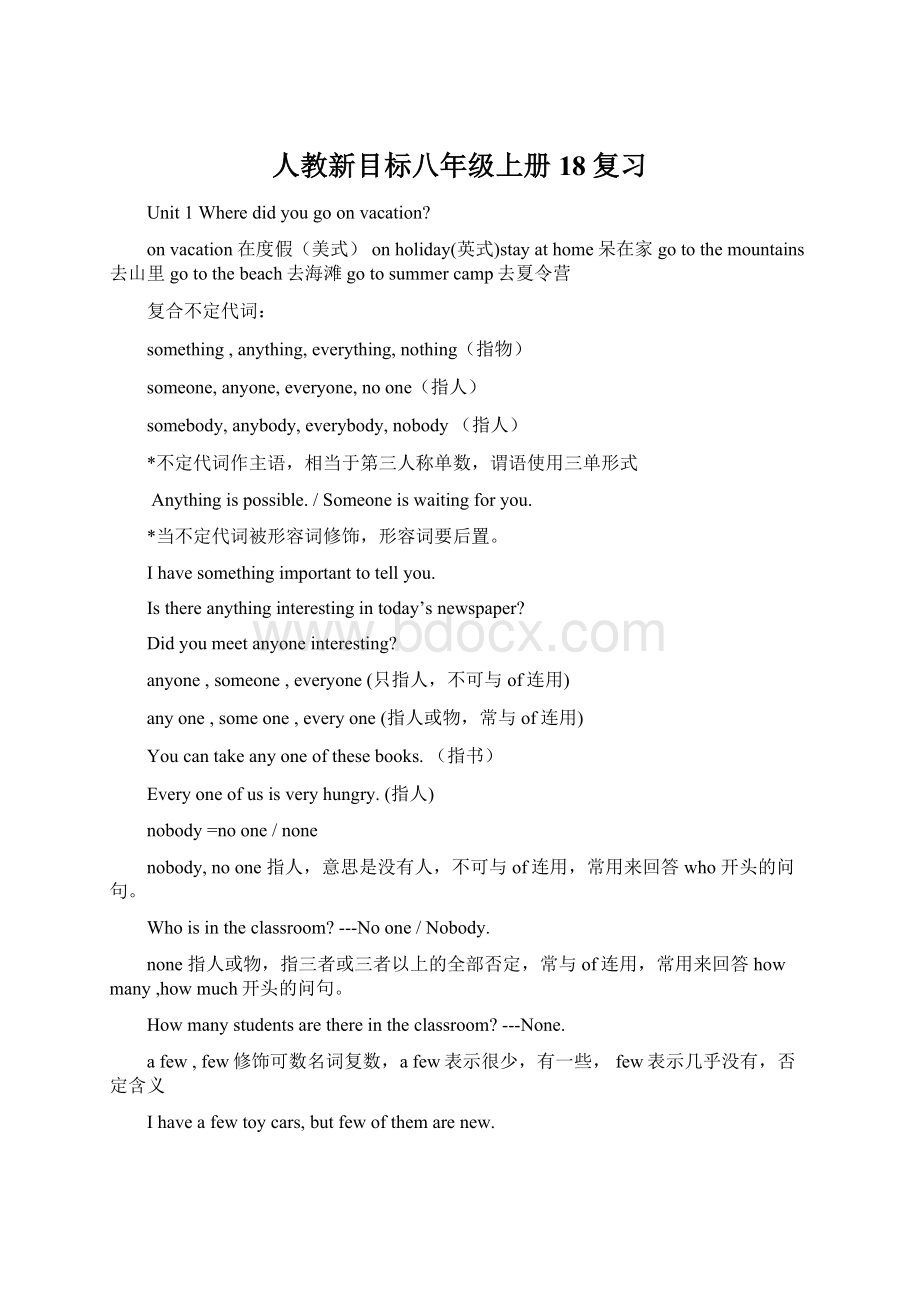人教新目标八年级上册18复习.docx
《人教新目标八年级上册18复习.docx》由会员分享,可在线阅读,更多相关《人教新目标八年级上册18复习.docx(27页珍藏版)》请在冰豆网上搜索。

人教新目标八年级上册18复习
Unit1Wheredidyougoonvacation?
onvacation在度假(美式)onholiday(英式)stayathome呆在家gotothemountains去山里gotothebeach去海滩gotosummercamp去夏令营
复合不定代词:
something,anything,everything,nothing(指物)
someone,anyone,everyone,noone(指人)
somebody,anybody,everybody,nobody(指人)
*不定代词作主语,相当于第三人称单数,谓语使用三单形式
Anythingispossible./Someoneiswaitingforyou.
*当不定代词被形容词修饰,形容词要后置。
Ihavesomethingimportanttotellyou.
Isthereanythinginterestingintoday’snewspaper?
Didyoumeetanyoneinteresting?
anyone,someone,everyone(只指人,不可与of连用)
anyone,someone,everyone(指人或物,常与of连用)
Youcantakeanyoneofthesebooks.(指书)
Everyoneofusisveryhungry.(指人)
nobody=noone/none
nobody,noone指人,意思是没有人,不可与of连用,常用来回答who开头的问句。
Whoisintheclassroom?
---Noone/Nobody.
none指人或物,指三者或三者以上的全部否定,常与of连用,常用来回答howmany,howmuch开头的问句。
Howmanystudentsarethereintheclassroom?
---None.
afew,few修饰可数名词复数,afew表示很少,有一些,few表示几乎没有,否定含义
Ihaveafewtoycars,butfewofthemarenew.
alittle,little修饰不可数名词,alittle表示很少,有一些,little表示几乎没有,否定含义
Ihavelittlewaterinthebottle,canyougivemealittle?
quiteafew相当多,修饰可数名词复数,quitealittle相当多,修饰不可数名词
mostofthetime大多数时间,在此most是代词,mostofthestudents
most还可以用作形容词,moststudents
反身代词:
用来强调或表示动作返回执行者本身,与所代的名词在人称和数上保持一致。
myself,yourself,himself,herself,itself,ourselves,yourselves,themselves
常和反身代词连用的短语有:
enjoyoneself=haveagoodtime
teachoneself=learn…byoneselfItaughtmyselfEnglish.=IlearnedEnglishbymyself.
helponeself(to)请自便,请随便吃点Helpyourselvestosomefish,TomandJane!
byoneself亲自,独自Hegoestoschoolbyhimself.
feedsbsth=feedsthtosb
feed…with/onsth用…来喂某人、物
feedon以…为食
nothingbut(to)do除…之外
Ihadnothingtodobut(to)sitdownandwait.
seemtodosth可转换成itseems/seemedthat
Heseemstoknowtheanswer.=Itseemsthatheknowstheanswer.
decidetodosth决定做某事decidenottodosth决定不做某事decideonsth/doingsth
名词:
decision做决定:
makeadecision
trytodosth努力、尽力做某事,付出一定的努力,否定结构trynottodosth尽力不做某事
YoumusttrytolearnEnglishwell.你必须尽力把英语学好
I’lltrynottoreadinbed.我会尽力不躺在床上看书
trydoingsth尝试做某事,不一定要付出努力
tryone’sbesttodosth尽某人最大的努力做某事
I’lltrymybesttowinthegame.我会尽我最大的努力赢得比赛。
feellike感觉到,给…的感觉
Ifeltlikeanewmanmyself.我感觉自己换了一个人。
feellikedoingsth=wanttodosth=wouldliketotosth想要干某事
Idon’tfeellikeeatingtoday.
arrivein(大地方)arriveat(小地方)=getto=reach到达
wonder=wanttoknow,后常接宾语从句,注意宾语从句的语序为陈述句语序
Iwonderwhoheis./ShewonderedwhatIdidlastnight.
enjoydoingsth=likedoing
感叹句:
What+(a/an)+adj+n+(主+谓)!
Whatawonderfulmovie(itis)!
How+adj/adv+the+n+谓!
Howwonderfulthemovieis!
difference可数名词区别,差别形容词是different
atthetopof在…的顶部Wehadapicnicatthetopofthemountain.
over=morethan超过waitforsb/sth等待某人、某物
toomany太多的,修饰可数名词复数toomuch太多的,修饰不可数名词
muchtoo非常,修饰形容词
hard:
形容词困难的,艰难的hardwork艰难的工作
坚硬的ahardstone
副词努力地workhard努力地工作
猛烈地(指雨、雪下得大)rainhard=heavily
because+句子becauseof+名词或名词性短语
Becausetheweatherwasbad,westayedathome.
Becauseofthebadweather,westayedathome.
below非垂直下方----above非垂直上方under垂直下方---over垂直上方
enough:
形容词,修饰名词,enoughtime/enoughmoney
副词,修饰形容词或副词,后置bigenough
adj+enoughtodosth足够…干某事Heisoldenoughtogotoschool.
as+adj或adv的原级+as和…一样…HeisasoldasTom.他和Tom一样大
JaneisastallasJack.Jane和Jack一样高
notas…as不如,不及Heisn’tasoldasTom.他没有Tom大
thesameas和…一模一样Myschoolbagisthesameasyours.
forgettodosth忘记去做某事(没做)forgetdoingsth忘记做过某事(已做)
stoptodosth停下来去做另一件事stopdoingsth停止做某事
another+数+名词复数=数+more+名词复数
anothertwohours=twomorehours
dislikedoingsth/disliketodosth
Howdoyoufeelabout…?
=Howdoyoulike…?
=Whatdoyouthinkof…?
keepdoingsth持续做某事keepsbdoingsth使某人持续干某事
keep+adjkeepquiet=keephealthyinexcitement激动地,兴奋地
goontodosth继续做另一件事goondoingsth继续做原来做的事
findout发现,找出
Unit2Howoftendoyouexercise?
howoften对频率提问,回答一般是表示频率的单词或短语,often,always,onceaweek,everyday等。
Howoftendoyouexercise?
Twiceaweek.
howlong对时间段提问,也可以对物体的长度提问.HowlongdoyouwatchTVeveryday?
---Abouttwohours./Howlongisyourdesk?
howmanytimes多少次,对次数提问,回答一般是once,twice,threetimes…等表示次数的词
Howmanytimesdoyouexerciseinaweek?
----Aboutthreetimes.
howsoon意为“还要多久”,回答一般用in+一段之间,这里的介词in表示将来的一段时间之后。
Howsoonwillyoucomeback?
-----Inthreeweeks.
helpwithhousework帮忙做家务(housework不可数)helpwithsth在某一方面帮助某人=
helpsbdosth=helpsbtodosth
exercise锻炼动词Heexerciseseveryday.
锻炼不可数名词doexercise(做锻炼)
体操,练习可数名词domorningexercises/doeyeexercises/Englishexercises
sometimes有时候sometimes几次,几倍sometime一段时间sometime某时,有朝一日
hardly否定含义,意为几乎不Heworkshard,andhehardlygoestobedbefore23:
00.
everyday每一天,表示频率
everyday日常的,每天的everydaylife日常生活everydayEnglish日常英语
once一次onceayear一年一次
曾经Heoncelivedhere.他曾经住在这里。
atonce立刻,马上Youshouldseethedoctoratonce.你应该立刻去看医生。
What’syourfavoriteprogram?
=Whatprogramdoyoulikebest?
usetheInternet=surftheInternet=goonline上网
Nextweekisquitefullforme.对于我来说,下周非常忙。
此句中的full=busy
full的其他用法:
饱的I’mfull.我饱了。
反义词hungry
满的,充满befullof=befilledwith
Theroomisfullofsmoke.=Theroomisfilledwithsmoke.房间里充满了烟。
Howcome?
怎么会?
为什么?
可单独使用,也可以接句子,用来询问事情的缘由
Howcometheskyissoblue?
天怎么会这么蓝呢?
maybe或许,可能,大概,常位于句首,也可位于句中或句末,省略句子的结构仍完整。
maybe可能是,也许是,是由情态动词may加动词原形be构成,在句中作谓语,不可省略
Maybesheisateacher.====Shemaybeateacher.
stayuplate熬夜到很晚eatahealthybreakfast吃一段健康的早餐atleast至少,起码
wantsbtodosth=wouldlikesbtodosth想要某人干某事
begoodfor对…有益bebadfor对…有害Drinkingmilkeverydayisgoodforourhealth.
begoodat擅长begoodwith和…相处的好,善于应付…
health名词健康healthy形容词健康的
ingoodhealth=healthy健康的Heisingoodhealth.=Heishealthy.
inbadhealth=unhealthy不健康的Theoldmanisinbadhealth.=Theoldmanisunhealthy.
keepingoodhealth=keephealthy保持健康
gocampinginthecountry去乡村露营
inone’sfreetime在某人空闲的时间IoftenwatchTVinmyfreetime.
asksbaboutsth询问某人关于某事Don’taskgirlsabouttheirages.
freetimeactivities课余活动useoftheInternet网络的使用(use是名词)
resulttheresultof……的结果Thisistheresultofthebasketballgame.
asaresult因此,结果Heiscleverandworkshard,asaresult,theteachersalllikehim.
数字+percentof+n作主语,谓语动词的数根据of后面的名词来定
50%oftheboyslikeP.E./15%ofthewaterisdirty.
onceortwiceaweek(每周一两次),偶尔也会用oneortwotimesaweek
twoorthreetimesaweek(每周两三次,注意不用twice)threeorfourtimesaweek(每周三四次)数字相邻,用or连接
onetothreetimesaweek(每周一到三次,注意不用once)fourtosixtimesaweek(每周四到六次)数字不相邻,用to连接
notatall不用谢,没关系
not…atall=not…intheslightest一点也不,根本不
I’mnothappyatall.=I’mnothappyintheslightest./Idon’tlikeEnglishatall.=Idon’tlikeEnglishintheslightest.
surprise动词,使…吃惊Itsurprisedmealot.(句中的surprised是surprise的过去式)
名词,惊喜,惊奇givesbasurprise给某人一个惊喜toone’ssurprise令某人吃惊的是Tomysurprise,hewonthegame.insurprise好奇地,惊奇地Thestudentslookedattheirteacherinsuiprise.
surprised形容词,好奇的,惊奇的(修饰人)
besurprisedthat+句子Iwassurprisedthathedidn’tcome.
besurprisedatsth对…感到吃惊Hewassurprisedatthenews.
besurprisedtodosthHewassurprisedtomeetme.
surprising形容词,修饰物
theanswerto=thekeyto…的答案
although/though…but不可以同时出现在一个句子中
Althoughhewasill,hewenttoschoolasusual.虽然他生病了,但是他还是和往常一样上学。
by依靠,凭借(方法,手段)+名词、代词、doingsth
Hehasnohands.Hewritesbyfeet.
Imakealivingbyteaching.我靠教书谋生。
Hemademoneybysellingnewspapers.他靠卖报纸挣钱。
through通过,穿过
穿过,指从物体的内部空间穿过,gothrough穿过forest,park,city等
通过,凭借Youcanwinthroughhardwork./Hegotajobthroughafriend.
thebestwaytorelax放松的最佳方式,torelax作后置定语,修饰前面的way
abestplacetovisit参观的最佳地方
mind心智名词changeone’smind改主意makeupone’smind下定决心
介意动词minddoingsth介意干某事Wouldyoumindopeningthewindow?
Nevermind.没关系
suchas=like例如suchas后面如果接动词,通常用doing的形式
Exercisesuchasplayingsportsisfun.
spendtimewithsb与某人东渡时光
spend花费,主语必须是“人”常用的结构有:
spendtime/moneyonsth
spendtime/money(in)doingsth
cost花费,主语必须是“物”
take花费,主语通常是it形式主语,结构是ittakes(took)sbsometimetodosth
pay付钱,主语是“人”,常与for连用Ipaid30yuanforthisbook.
as如同,像thesameas和…一模一样
当…时候=whenAs/WhenIwalkedalongthestreet,Ifoundawallet(钱包).
Oldhabitsdiehard.旧习难改
a16-year-oldgirl一个16岁的女孩an8-year-oldboy一个8岁的男孩
a2-dayholiday一个两天的假期
gotothedentist=seeadentist去看牙医seeadoctor去看病
however,转折关系,相当于but,however与前后的句子之间都要用逗号隔开
Ihadatoothache(牙疼),however,Ididn’twanttogotothedentist.
beafraid害怕beafraidofsth/doingsth;beafraidtodosth
almost几乎,差不多在实意动词之前,be动词、助动词、情态动词之后
Itisalmostnew./Healmostforgotme.
unit3I’mmoreoutgoingthanmysister.
形容词、副词的比较级构成规律
1.一般情况下,在形容词、副词的词尾直接+er,最高级+est:
tall,taller,tallest
2.以e结尾的形容词、副词,在词尾直接+r,最高级+st:
nice,nicer,nicest
3.以辅音字母+y结尾的双音节词,变y为i,再+er,最高级+est:
easy,easier,easiest/shy,shyer,shyest(shy,shier,shiest)
4.重读闭音节,词尾只有一个辅音字母,双写该辅音字母,再+er,最高级+est:
big,bigger,biggest/thin,thinner,thinnest/fat,fatter,fattest/hot,hotter,hottest
5.多音节和部分双音节词,在原级前+more,最高级+most:
beautiful,interesting,important,popular,wonderful,outgoing,clearly,tired,useful,careful
不规则变化:
good/well,better,best;bad/badly/ill,worse,worst;many/much,more,most
little,less,least;far,farther/further,farthest/furthest;old,older/elder,oldest/eldest
比较级的用法:
1.基本句子结构:
A+be+形容词比较级+than+B:
I’mmoreoutgoingthanyou.
A+实义动词+副词比较级+than+B:
TomjumpshigherthanJack.
注意:
同类事物才能做比较。
正确:
Mypenisbiggerthanyours.
错误:
mypenisbiggerthanyou.
2.两者(A与B)进行比较,“A比B大/长/高……”,数量词放在比较级的前面,即:
A+谓语+数量词+形容词